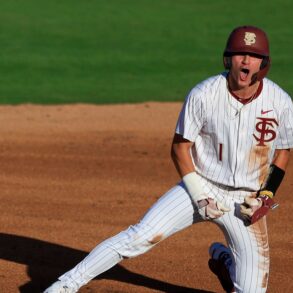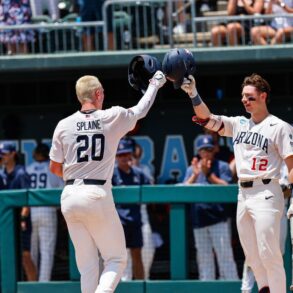
Image credit:
(Photo by Zac BonDurant/Getty Images)
Day One of Super Regionals is in the books and Friday reminded us of what makes June so captivating.
Some national seeds flexed. A mid-majors proved, again, that it belong on this stage. A heavyweight showdown in Corvallis gave us a wild comeback and one of the postseason’s best moments so far. And while the baseball world buzzed, the entire landscape of college athletics shifted in a way that’s going to impact the sport for years to come.
We’ll dive into all of it here—the upsets, statement wins, stars of the day and what Friday’s off-the-field news means for the future of college baseball.
North Carolina Opens with Statement Win
Every postseason bracket delivers a dose of cruelty—whether through brutal travel, unfavorable matchups or bad timing against a red-hot opponent. Few teams drew a tougher hand this year than Arizona, which opened super regionals thousands of miles from home in front of a frenzied North Carolina crowd and against a Tar Heel team that could go all the way.
The matchup looked daunting on paper and proved even more so on the field.
The Tar Heels unloaded on the Wildcats for an emphatic 18-2 win in Friday’s opener, making clear they have no intention of missing their shot at Omaha.
This is as complete a team as remains in the field. Every North Carolina starter reached base in the rout, with eight collecting hits and four launching home runs. On the mound, righthander Jake Knapp continued his dominant postseason run, matching a school record with his 14th win, a mark that had stood since 1978.
With a rested and effective bullpen and an offense now fully firing after entering the tournament with some lingering questions, North Carolina suddenly looks like a national title threat.
With two chances to close the series, the Tar Heels will aim for an encore on Saturday and a return trip to college baseball’s biggest stage.
Coastal Continues Winning Streak to Open Supers
Friday’s opening slate didn’t deliver much in the way of true upsets. North Carolina’s blowout win went to script, and while Florida State fell to a talented Oregon State club, that result was well within expectation. If any outcome bordered on surprise, it was Coastal Carolina knocking off Auburn—though in truth, this was no upset at all.
In Baseball America’s view, the Chanticleers are simply performing to their standard.
Coastal has looked like an Omaha-caliber team for weeks, and Friday’s 7-6, extra-innings victory only underscored that. Coastal jumped out to an early lead but had to weather Auburn’s surge, as the Tigers erased a five-run deficit to force extras. There, Blake Barthol’s pair of spectacular defensive plays at second base and a catcher Caleb Bodine’s second solo home run of the game sealed it.
The Chants entered the postseason with the nation’s premier pitching staff, a unit capable of shutting down any lineup in the country. What was less certain was whether their offense would consistently match that level and that question looks answered now.
As we noted back in April, if Coastal could pair its elite arms with steady run production, it had the ingredients to contend for a title. One win from Omaha, it’s all coming together.
Don’t Doubt the Beavers
Oregon State hasn’t clinched a College World Series berth just yet—two losses in the next two days would still end its run—but after Friday night’s comeback, I’m ready to eat some crow.
Before the postseason, I questioned whether Oregon State had the résumé to warrant a top-eight national seed. I had Coastal Carolina pegged for that No. 8 spot and picked the Beavers comfortably as a host, but not much more. Then they powered through their regional, and despite that, I still picked Florida State to win the Corvallis Super.
Clearly, doubting this Oregon State team is a mistake.
For most of Game 1, it looked like Florida State would prove me right.
Joey Volini spun 6.2 strong innings, allowing one run with eight strikeouts, and Joe Charles dominated in relief—until he didn’t. Needing one final out in the ninth, Charles gave up three runs, capped by a clutch, two-strike, two-out game-tying single from Jacob Krieg. Oregon State walked it off in the 10th.
There’s no other way to say it: this Beavers team is gritty, talented and hard to kill. Friday night proved as much. They’ve earned full respect—and could be Omaha-bound very soon.
Louisville Secures Pivotal Game 1 Win, Miami Saves Ace
Louisville left little doubt in Friday’s Super Regional opener, dispatching Miami 8-1 in a game that turned lopsided after a brief early battle. The Hurricanes trimmed the lead to 2-1 in the top of the third, but from there, the Cardinals took full control, clicking in all phases and never letting up.
Jake Munroe was the offensive star, launching two home runs and driving in five runs to pace the lineup. On the mound, Patrick Forbes was reasonably sharp, striking out nine over 5.2 innings to set the tone.
It was as balanced and businesslike a performance as Louisville could have asked for, putting it one win from Omaha.
Now, all eyes turn to how Miami responds. Despite the lopsided result, this isn’t a mismatch on paper and the Hurricanes made a strategic choice that could loom large. By holding ace Griffin Hugus for Saturday’s elimination game, Miami preserved its best arm for when it matters most. The gamble didn’t flip Game 1, but it gives the Hurricanes a fighting chance to extend the series.
It’s also a fascinating case study in modern postseason pitching strategy, which we explored in more depth here.
Player of the Day
There were several worthy candidates for Friday’s top individual honor. Blake Barthol nearly earned it after a pair of jaw-dropping defensive plays, including a game-ending double play that sealed Coastal Carolina’s extra-innings win. Jake Knapp was in the conversation too—his ability to pitch deep into games is gold this late in the postseason, and he delivered again in North Carolina’s blowout victory.
But in the end, Jacob Krieg takes the crown. No player provided a bigger, more dramatic moment than the one Krieg produced in Corvallis.
Here’s the scene: Oregon State trailed Florida State 4-1 entering the bottom of the ninth. A bases-loaded wild pitch trimmed the gap to two. Then, with runners on second and third and two outs, Krieg—the Beavers’ nine-hole hitter—worked the count to 2-2 then lined the ball to left, driving in both runs to tie the game and ignite the home crowd. The Beavers would walk it off an inning later.
Krieg finished 2-for-4 with a double and two RBI, but it’s that ninth-inning swing that earns him this honor. On a night with limited drama, no moment loomed larger.
Big News For College Sports
Let’s zoom out for a minute to close, because the scope of this last topic is massive: college athletics changed forever last night.
While we were all locked into baseball, Judge Claudia Wilken of the United States District Court for the Northern District of California officially approved the landmark $2.8 billion House vs. NCAA settlement.
So what does that actually mean?
In short, schools can now start paying athletes directly through a new revenue-sharing model. Most power-conference schools will divide up about $20.8 million a year, with the majority earmarked for football. But how that money gets allocated is up to each school.
On top of that, NIL deals are still allowed—and likely still necessary for schools that want to go above and beyond. But there’s a new wrinkle: any NIL deal worth more than $600 now has to be reviewed and approved by the new College Sports Commission, led by former MLB exec Bryan Seeley. And here’s a key date—any new NIL deals signed after midnight on June 7 will fall under that review process, which is rumored to be more unkind to booster-driven contracts compared to sponsorship-type deals with companies.
For baseball specifically, the impact is huge.
The sport’s outdated 11.7 scholarship limit will phase out, with teams soon able to fund up to 34 full scholarships. Most power programs are expected to start in the 22-plus range and build from there.
It’ll take time for all of this to fully kick in. But make no mistake—college sports will never be the same.
This post was originally published on this site be sure to check out more of their content.




